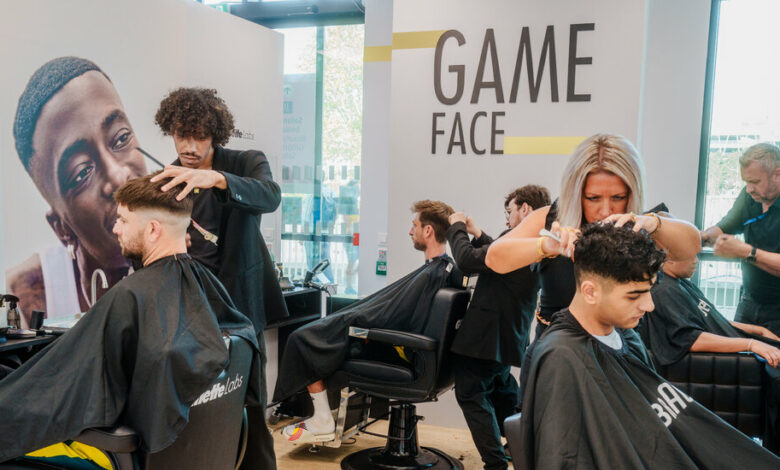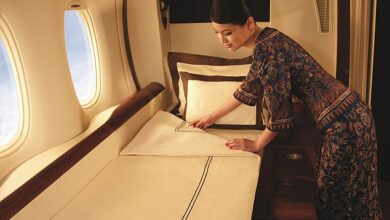The barber will see you now. The world will see you after this.

They are one of the most popular teams at the Olympics. Their hand-eye coordination is off the charts. Their uniforms? Head to toe black and très chic.
They are the hairstylists of the Summer Games, standing by in the athletes’ village to tend to any Olympian in need of care. Their mission is to live up to the old sports mantra: look good, feel good, play well.
“I’m not going to look like a sloppy girl,” said Aphiwe Dimba, 23, a goalie for the South African national hockey team, as she sat in a stylist’s chair last week. “It makes me feel more confident after I get my haircut. You never know who’s taking your picture.”
If the Olympic Village cafeteria is a place for spontaneous social interaction, the serene salon in the central plaza is a haven for self-care: relaxing, rejuvenating and optimizing your aura before the competition.
The hair salon, a fixture at every Olympics, is open every day this summer from 9 a.m. to 9 p.m. On a recent morning, a runner from Great Britain got a haircut, a boxer from Uzbekistan braided her long blond hair and a BMX racer from Colombia had her nails painted in the colors of her national flag.
On some days, there are as many as 10 hairdressers in the space, all from top salons in France and equipped to recreate an authentic beauty salon and barbershop. The only difference is the price: for Olympians, the haircut is free.
“It’s a moment for them to relax and forget about the competition,” said Darygue Cordinier, who left Chopperhead, his Paris barbershop, to work at the Olympics this month. “We’re here to take care of them.”
But looking good is not just a superficial pursuit, according to athletes.
Zigmars Raimo, a three-on-three basketball player from Latvia, said that proper care was actually prescribed by the team’s coach to optimize performance.
“He always says, ‘If you look good, you play good,'” said Raimo, who came in one morning a few hours before a game to have his beard trimmed. “In the morning, before training, you can’t come with messy hair or a full-grown beard. It means you’re not ready to play if you don’t take care of yourself.”
Kristi Wagner, an American rower, said the ritual of washing and styling her hair was “a form of mediation” — one that is all too rare when she’s on the road as an elite athlete and all the more necessary in an environment as daunting as the Olympics.
And Daina Moorehouse, a boxer from Ireland who got her nails done at the salon, said it just made sense that she wanted to look her best during what she would likely call one of the highlights of her professional life.
“I like to fight in style,” said Moorehouse, who laughed as she acknowledged that her fingernails would be hidden in her gloves. “Before I even got here, I had my eyelashes, my hair, my eyebrows done. It’s the most important thing in my life, so why not? I had my teeth whitened.”
Laureen Menez, a nail and makeup artist from Paris, said she enjoyed the chance to meet so many athletes from around the world and hear about their lives. (“They’re all so cute!”) She was building up a large collection of team badges given to her by athletes, while attending up to 12 nail appointments a day.
At the same time, the stylists said they were not impressed by the intense atmosphere of the Games and the possibility of their work being watched by millions of people on television or famous athletes walking through the doors.
“We’re used to working with a lot of stars, so it’s easy to be professional,” said Sabrina Derkaoui, a stylist at the Raphaël Perrier salon in Paris, who maneuvered around her chair in a black jacket and billowing cargo pants. “I don’t know who these athletes are.”
A spokeswoman for the salon said on Wednesday afternoon that athletes from 145 countries had come for a total of more than 800 treatments since the start of the Games.
Many athletes said that haircuts were part of their competition routine. But some said they initially worried that French hairdressers would have problems with their hair type or their stylistic requests.
Nyl Yakura, a Canadian badminton player of Asian descent, said it was “a little risky” to put his hair in the hands of an unknown hairdresser far from home. And Dimba, the South African hockey player, said her team had traveled to tournaments in countries like India and China where hairdressers weren’t sure how to handle her tight curls.
“It was quite stressful,” said Dimba, who ended up taking a pair of clippers with her to the Olympics in case she couldn’t find anyone who could cut her locks properly.
But Yakura, Dimba, and most of the other athletes walked out of the salon more than satisfied. They felt refreshed. They had taken care of themselves. They were ready to compete.
And the Olympians, without realizing it, had already made the stylists’ job easier
“It’s not hard because all the athletes have the same style: just do a fade on the side,” Cordinier said, laughing. “It’s the same haircut. It’s easy.”




